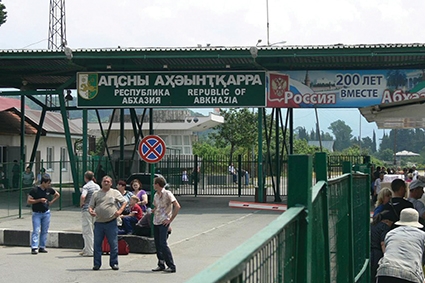Georgia Discusses Trade Routes with Russia through Disputed Regions
On January 31, Zurab Abashidze, representative of the Georgian Prime Minister, and Grigory Karasin, the Deputy Foreign Minister of Russia, met in Prague to discuss opening two extra transit routes between the two countries. The routes proposed would go through the disputed regions of Abkhazia and South Ossetia.
An agreement has not yet been met, and Abashidze told reporters “there was a serious difference on positions in Prague. It was confirmed that the Russian side interprets the agreement on customs monitoring in a completely different way.”
Currently, there is only one trade route which runs between Russia and Georgia; from North Ossetia through the Upper Lars customs point. This road has two problems: it is very narrow, meaning long waiting times, sometimes of more than a day; and being in a mountainous area, the road is vulnerable to frequent blizzards and floods, resulting in the road being closed for unpredictable periods of time.
In the contract, the two new routes proposed are the main road from Vladikavkaz through South Ossetia to the Gori region, and the road from Sochi through Abkhazia to Zugdidi. Both routes go through conflict zones, which is why the routes have been closed since the 1990s. The contract being discussed says that these two routes would only be used if the main one already open were to be closed.
Political analyst and professor at the Grigol Robakidze University, Paata Zakareshvili, told reporters that “the contract with SGS is different from the contract of 2011 in that Georgia agrees to potentially open transport via roads through Abkhazia and South Ossetia. This was definitely not Georgia’s main aim, and it has probably been lobbying against the idea. The project has become increasingly more important, but even if it proceeds, the question remains: Will the alternative transport roads actually open in emergency situations or will this part of the agreement remain solely on paper?”
An MP from the European Georgia party, Sergi Kapanadze, told reporters that this “is indeed a very good and necessary agreement.”
He went on to say that “Georgia has finally achieved international observers on the borders of the occupied regions […] Georgia has also got hold of a mechanism that will act on an international level, which will allow for commercial operations to be conducted through the occupied territories.”
“But it’s important to highlight that here we are talking about possibilities: the mechanism itself will not give birth to commerce and does not obligate any of the parties to act in this direction,” he clarified.
Russian Deputy Minister of Foreign Affairs, Grigori Karasin, said, “we have great hopes for this agreement: we hope it will give a powerful boost to commerce in the region.”
Although the transit points proposed go through Abkhazia and South Ossetia, Karasin told Russian newspapers that the document “does not entail obligations for third-party countries, including, of course, the Republic of Abkhazia and the Republic of South Ossetia.” He made no comment on what this means for those regions, which Russia recognizes as separate countries.
The discussion of trade points being opened has been on-going since 2011, when Russia joined the World Trade Organization (WTO). One of the conditions for Russia to join the WTO was that all of the countries had to approve, and Georgia, already a member, took this as an opportunity to control goods coming from Russia into the breakaway regions of Abkhazia and South Ossetia.
A condition of Georgia’s approving their vote which Tbilisi demanded, was that Moscow agree to have a third impartial country to monitor the shipments. After much negotiation, Switzerland was agreed upon, and the Russian and Georgian governments signed a bilateral “Agreement on the Basic Principles of the Mechanism of Customs Administration and Trade Monitoring” on 9 November 2011. A private Swiss company called SGS Switzerland SA was chosen to monitor trading.
Georgia signed the contract on December 19, 2017, and once the contract has been signed by Russia, the project will become realized. This was what was being discussed in Prague, without any tangible results.
Tom Day












